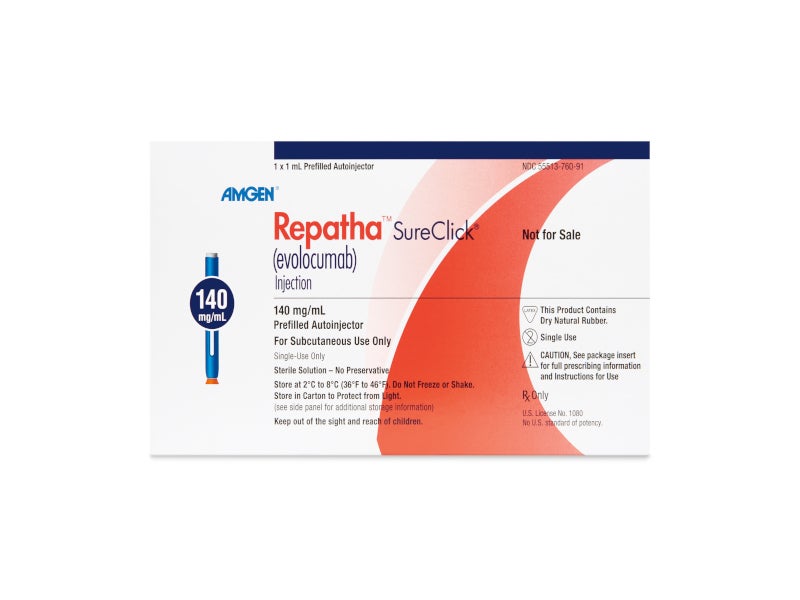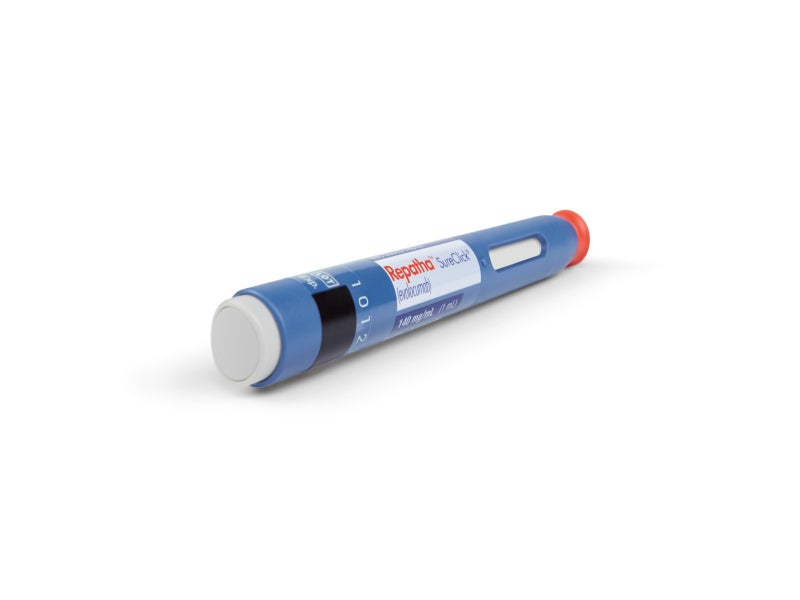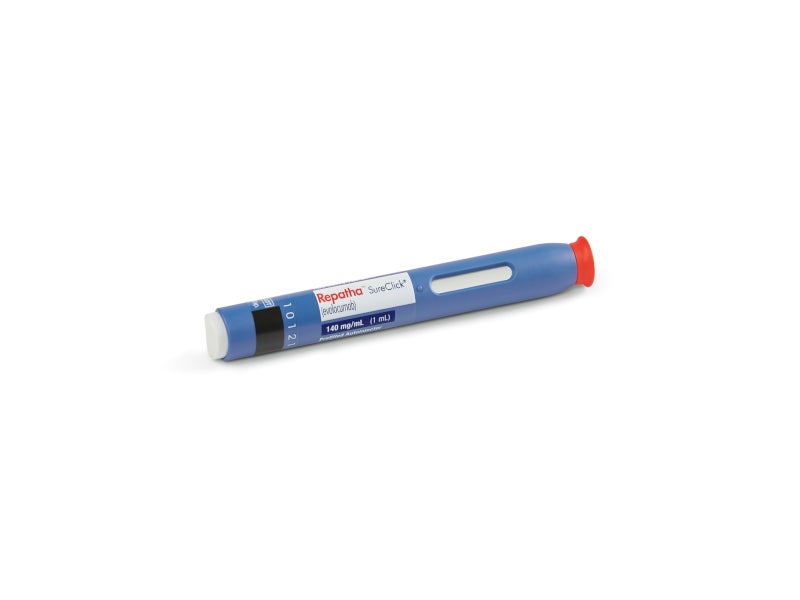Repatha (evolocumab) is a human monoclonal antibody that inhibits proprotein convertase subtilisin/kexin type 9 (PCSK9) for lowering cholesterol in patients.
It is indicated to reduce the risk of myocardial infarction, stroke, and coronary revascularisation in adults with established cardiovascular disease (CVD).
It’s also prescribed for adults with primary hyperlipidaemia and heterozygous familial hypercholesterolemia (HeFH) to lower low-density lipoprotein cholesterol (LDL-C) levels when diet and other treatments aren’t enough.
Additionally, it’s used in paediatric patients aged ten and older with HeFH to reduce LDL-C, and in both adults and paediatric patients aged ten and older with homozygous familial hypercholesterolemia (HoFH) to lower LDL-C when other treatments are inadequate.
Repatha is developed by Amgen, a biopharmaceutical company based in the US. It is the second PCSK9 inhibitor approved by the US Food and Drug Administration (FDA) after Praluent.
Repatha injection is available in different strengths of 420mg/3.5ml solution single-dose Pushtronex system (on-body infuser with prefilled cartridge), 140mg/ml solution single-dose SureClick autoinjector, and 140mg/ml solution single-dose prefilled syringe.
Regulatory approvals for Repatha
Repatha, the first PCSK9 inhibitor in Europe for treating primary hypercholesterolaemia or mixed dyslipidaemia and HoFH, received marketing authorisation from the European Commission in July 2015.
The FDA approved Repatha as an adjunctive treatment for HeFH, atherosclerotic cardiovascular disease (ASCVD), and HoFH in August 2015.
In Japan, it became the first PCSK9 inhibitor for high cholesterol treatment in January 2016, developed by Amgen Astellas BioPharma, a joint venture between Amgen and Astellas Pharma, a Japanese pharmaceutical company.
The FDA approved Repatha in December 2017 to prevent heart attacks, strokes, and coronary revascularisations in individuals with established cardiovascular disease.
Health Canada authorised Repatha in June 2018 as an adjuvant to diet and standard-of-care therapy for preventing myocardial infarction, stroke, and coronary revascularisation in adults with ASCVD.
The Therapeutic Goods Administration of the Australian Government Department of Health approved Repatha in March 2019 for treating cardiovascular events.
In September 2021, the FDA approved Repatha for reducing LDL-C in HeFH paediatric patients aged ten years and older, based on the HAUSER-RCT Phase IIIb study. Repatha has been approved in more than 75 countries, including the US, Japan, Canada, and all 28 EU member states.
Familial hypercholesterolaemia details
Familial hypercholesterolaemia (FH) is a genetic disorder that causes high levels of LDL-C or bad cholesterol in the blood.
It begins at an early stage and leads to cardiovascular diseases such as heart attacks and strokes. According to the US Centres for Disease Control and Prevention, heart disease is the leading cause of death in the US, causing 610,000 deaths a year.
An estimated 11 million people in the US suffer from FH, having uncontrolled levels of LDL despite treatment with statins or other cholesterol-reducing medicines.
Repatha’s mechanism of action
Repatha contains an active ingredient called evolocumab, a human monoclonal antibody that inhibits the PCSK9 protein responsible for reducing the liver’s ability to remove LDL from the blood. PCSK9 inhibitors are a new class of lipid-lowering drugs.
Evolocumab inhibits PCSK9 protein and prevents it from binding to the LDL receptor (LDLR), allowing LDLR to recycle back to the liver. By inhibiting the protein, the drug increases the number of LDLRs to clear from the blood, reducing LDL levels.
Clinical trials on Repatha
Repatha has shown promising results in Further Cardiovascular Outcomes Research with PCSK9 Inhibition in patients with Elevated Risk (FOURIER) Phase Ⅲ clinical trial, a double-blind, randomised, placebo-controlled study assessing CVD patients who were at risk for cardiovascular events.
FOURIER forms a component of Amgen’s Program to Reduce LDL-C and cardiovascular Outcomes Following Inhibition of PCSK9 In various populations (PROFICIO) programme, which conducts clinical investigations into Repatha’s effects on LDL-C and CVD across diverse high-risk populations.
The populations include individuals managed by statins, those intolerant to statins, individuals with genetic disorders, and patients with atherosclerosis.
The PROFICIO programme comprises 36 trials encompassing more than 38,000 patients globally.
The FOURIER trial evaluated the efficacy of Repatha with a statin, in reducing LDL-C levels. Patients were given either Repatha or a placebo.
The trial found that adding Repatha to a statin reduced LDL-C by an average of 63%. Additionally, 87% of patients achieved LDL-C equal to or less than 70mg/dL.
The primary endpoint was the first occurrence time of cardiovascular death, myocardial infarction, stroke, hospitalisation for unstable angina, or coronary revascularisation, with the secondary endpoint being the time to occurrence of cardiovascular death, myocardial infarction, or stroke.
Common adverse reactions include nasopharyngitis, upper respiratory tract infection, influenza, back pain, and injection site reactions.
In the study, the drug was found to decrease the likelihood of heart attack by 27%, stroke by 21%, and coronary revascularisation by 22%.
Additional clinical trials on Repatha
The HAUSER-RCT Phase Ⅲb clinical trial evaluated the safety, efficacy and tolerability of Repatha over 24 weeks of monthly subcutaneous injections in paediatric patients.
HAUSER-RCT trial was a multicentre, randomised, double-blind, placebo-controlled clinical trial in which patients aged ten to 17 years with HeFH were administered with 420mg Repatha or placebo. The trial’s primary endpoint was to measure the percentage change in LDL-C from baseline to week 24.
When compared with placebo, monthly Repatha treatment reduced LDL-C by a mean of 38% from baseline.
The most common adverse events observed in patients included nasopharyngitis, headache, oropharyngeal pain, influenza, and upper respiratory tract infection.
The Further cardiovascular OUtcomes Research with PCSK9 Inhibition in Subjects with Elevated – Risk-Open Label Extension (FOURIER-OLE) trials were conducted across multiple centres and were open-label extensions aimed at evaluating the long-term safety of evolocumab in participants who had finished the FOURIER study.
Consisting of studies 20130295 and 20160250, the FOURIER-OLE involved 5,035 and 1,600 subjects respectively, who had completed the FOURIER study (20110118) and were administered open-label evolocumab.
The participants were monitored for a median duration of five years in the first study and 4.6 years in the second.
Both studies indicated that Repatha, administered at either 140mg every two weeks or 420mg monthly, was both safe and well-tolerated.
During the OLE studies, patients were treated with Repatha for approximately five years, with certain individuals receiving Repatha for up to a cumulative duration of eight-and-a-half years across both the FOURIER and OLE studies. No new safety concerns were identified over the long term.
A significant and sustained reduction in LDL-C levels was observed, with more than 85% of patients achieving an LDL-C level below 40mg/dL during the OLE period.





